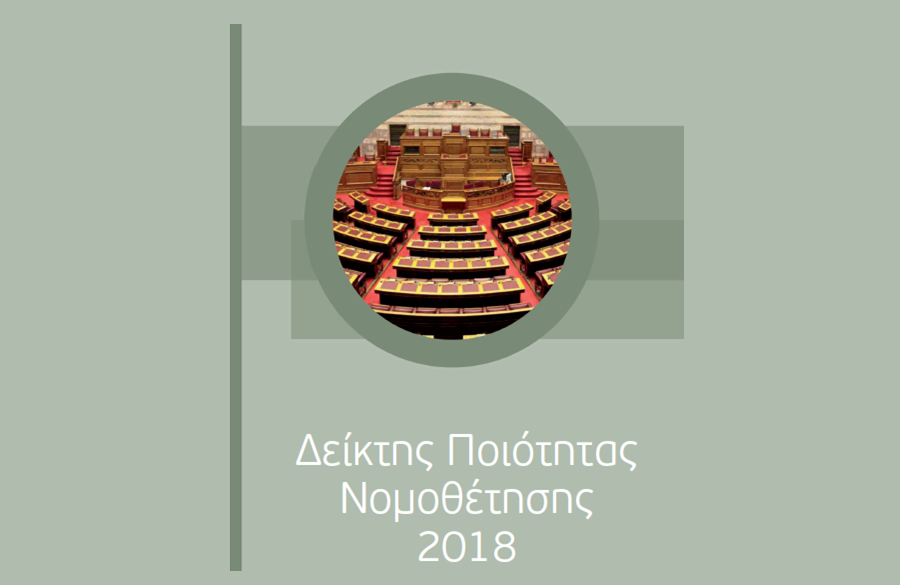
Greek Regulatory Quality Index 2018 | Study

Researchers:
Panagiotis Karkatsoulis | KEFiM’s research associate
Efi Stefopoulou | KEFiM’s research associate
Constantinos Saravakos| KEFiM’s researcher
The Regulatory Quality Index 2018 quantifies the quality of the laws passed in the Greek Parliament from 1/1 to 31/12 of 2018. Collecting data for over 50 variables, it evaluates all the laws of the year and checks whether the legal framework and international legislation good practices are observed in Greece.
One of the most important findings of the Index is that no law of 2018 meets the above standards, with the striking example that the vast majority of laws include irrelevant and overdue amendments. The Index seeks to enrich the public debate with measurable data, to act as a guide for better legislation and to be a useful tool for evaluating the legislative work for the citizens and the Parliament.
Regulatory Quality Index 2018 key findings:
- None of the 41 laws and 36 ratifications passed in 2018 meet the requirements of good legislation set by the current (4622/2019) or the previous (4048/2012) relevant law.
- 95% of the laws and 33% of the ratifications of 2018 were accompanied by amendments. Of these, 95% contain at least one amendment irrelevant to the main subject of the law, while 97% included at least one overdue amendment. Of the 248 amendments voted in total, 85% are irrelevant to the main subject and 72% are out of time.
- 25% of the laws of 2018 were not passed with the normal procedure in Parliament, but instead they followed the urgent or urgent procedure.
- 61% of the laws and ratifications of 2018 amend at least one other law that came into force from 2015 to 2018, ie passed by the same government.
- Only 54% of the 2018 laws were were put into a public consultation before being submitted to Parliament.
- 73% of the laws of 2018 include provisions with retroactive effect, the retroactivity of which is justified only in 7% of cases.
- 65% of the Regulatory Impact Assessments of the 2018 laws do not include quantitative data, 85% do not include provisions for simplification of procedures, while for none of the 2018 laws the administrative burdens were measured.
- For each law of 2018, there is an average of 25 authorizations for Ministerial Decisions. In total 1,036 authorizations for Ministerial Decisions given in laws, where only 20% was activated within 6 months from the enactment of the relevant law. The corresponding percentage for the issuance of Presidential Decrees is 7%.
- Each law of 2018 has an average of 17 signatures (from state officials), while the last law of the year (4587/2018) was signed by 34 members of the government.
- According to the Index, the best law for 2018 is 4513 “Energy Communities and Other Provisions” with a score of 69.5 / 100, and the worst is 4587 “Emergency regulations of the Ministry of Immigration and other provisions” with a score of 20.77 / 100.
- As the average person reads about 300 words per minute, with 8 hours of reading a day, it would take 60 working days to read the 2018 legislative output.
Read in English:
Regulatory Quality Index: Methodology and Implementation Guide for European Countries
A guide that focuses on the methodological framework for the best practices on regulation and on the way the Regulatory Quality Index was implemented in the Greek case. It also presents a road-map for other think tanks or organizations to adjust the Index to their own regulatory frameworks. More specifically it examines its adaption, implementation and promotion to the regulatory frameworks of Bulgaria and Turkey.
Σχετικά άρθρα

 Επιστροφή στη λίστα
Επιστροφή στη λίστα


